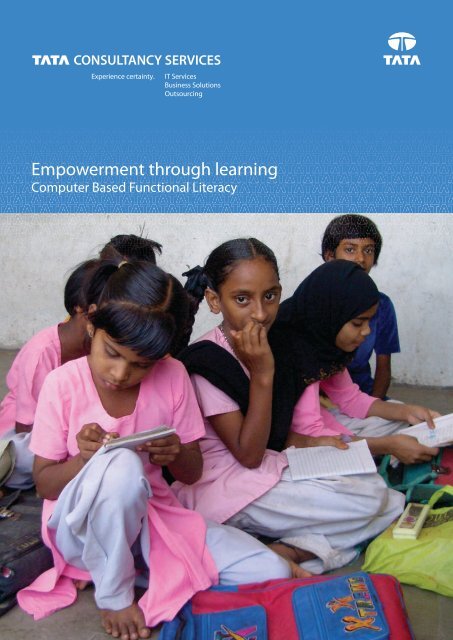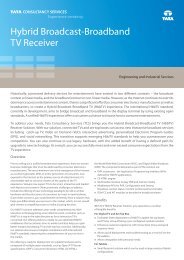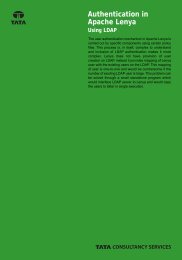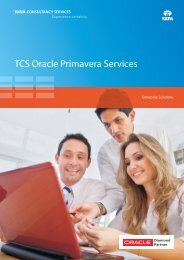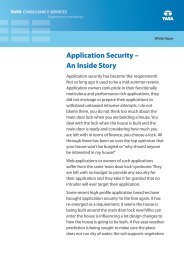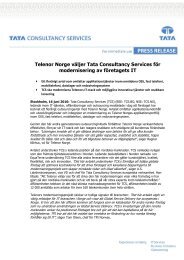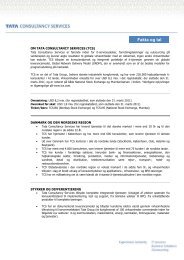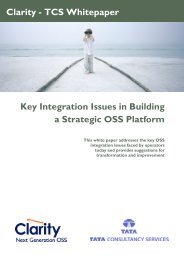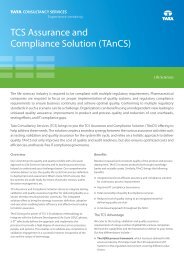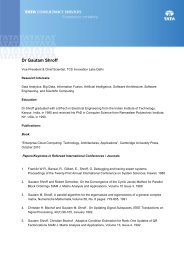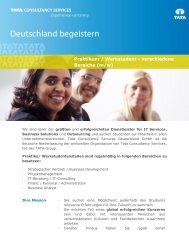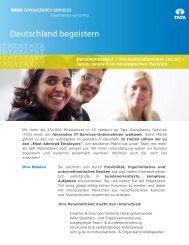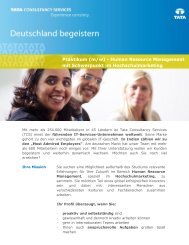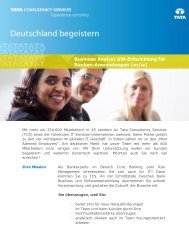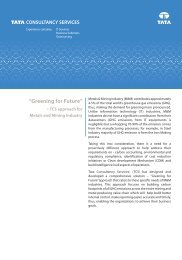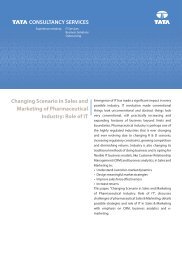Empowerment through learning - Tata Consultancy Services
Empowerment through learning - Tata Consultancy Services
Empowerment through learning - Tata Consultancy Services
Create successful ePaper yourself
Turn your PDF publications into a flip-book with our unique Google optimized e-Paper software.
<strong>Empowerment</strong> <strong>through</strong> <strong>learning</strong><br />
Computer Based Functional Literacy
Computer Based Functional Literacy<br />
Illiteracy is often synonymous with poverty. The written word can<br />
go a long way in empowering the less privileged. Traditionally it<br />
requires 200 hours of instruction —up to two years — to make<br />
a person literate. This leads to a high dropout rate. Convinced<br />
that economic development is related to literacy, TCS worked on<br />
a paradigm shift that would impact the 260 million illiterate in<br />
India. A corporate-wide initiative started in the year 2000 to<br />
address and overcome impediments of illiteracy <strong>through</strong><br />
information technology. Our efforts found success with the CBFL<br />
method. With computers and flash cards, we made use of<br />
animated graphics patterns for visualization and audio<br />
appreciation. A combination of graphic pattern of visualization<br />
and repetition of sound patterns lead to recognition, retention,<br />
and recall of words. Free of cost to the beneficiary who gets<br />
empowered by the privilege of basic education, this method<br />
ensures reading can be learnt within 40 to 45 hours of <strong>learning</strong>.<br />
The Technology<br />
Meet Gauzia,<br />
�The<br />
CBFL software was designed and developed by TCS using<br />
Multimedia features which enables the illiterate to develop<br />
reading skills in 40 hours<br />
�Metaphors<br />
in the multimedia presentation make it interesting<br />
and attractive for learners. Puppet Shows are used<br />
�Material<br />
from National Literacy Mission (NLM) is adopted for<br />
use in the program<br />
the entrepreneur<br />
Andhra Pradesh outback, India…<br />
A few years ago<br />
�It<br />
uses a minimal set of words to train learners on all letters in<br />
the language. The software has features for the learner to<br />
create new words for display and teaching.<br />
�A<br />
teacher can operate the computer and software easily. Even<br />
without any prior computer training, the teacher can learn to<br />
use the machine in a day<br />
�It<br />
is available in nine languages (Telugu, Tamil, Hindi, Marathi,<br />
Bengali, Gujarati, Oriya, Kannada, and Urdu)<br />
�It<br />
requires only a low end PC so that many PCs can be deployed<br />
at low cost<br />
Gauzia Begum’s husband was diagnosed with cancer. Her family’s savings had dried up.<br />
Her only child had to drop out of school. She wanted to help, but couldn’t. She was<br />
illiterate, with no skills, and lost. Her future looked bleak. She fought despair.<br />
Then one day, down Gauzia’s village dirt track came enlightenment. And a new way of life.<br />
That’s when her life was touched by the Computer Based Functional Literacy (CBFL)<br />
project by <strong>Tata</strong> <strong>Consultancy</strong> <strong>Services</strong>. With merely 40 hours of <strong>learning</strong> time, Gauzia<br />
transformed her life.<br />
Now<br />
Graduating from menial jobs, Gauzia has loaned some money from a micro-credit society<br />
spawned by a local self-help group. She runs a small shop and is ready to take on the<br />
future. This time, with hope…<br />
The Methodology<br />
�The<br />
teacher conducts classes using a computer for a batch<br />
of 10 to 15 students in a session. TCS trains the teacher and<br />
provides the software, donating computers on need basis.<br />
�No<br />
large scale infrastructure or major training of teachers<br />
is required.<br />
�Classes<br />
are run for one to two hours each day for about<br />
three months to suit the local community.<br />
�We<br />
partner with local governments or NGOs for effective<br />
implementation of the program. This enables them to start<br />
and manage the centers themselves.<br />
�The<br />
multimedia format ensures the pronunciation of the<br />
words/letters is taught accurately <strong>through</strong> the system,<br />
rather than being left to individual teachers.<br />
“I can now read newspapers, board the right bus, sign my<br />
name, help my children with their homework…<br />
It is a new life.”<br />
CBFL trainee<br />
Velimela Kalavathy (35),<br />
remote village in Andhra Pradesh, India
On the Indian Map<br />
The CBFL program is active in more than 250 centers spread<br />
across India in the states of Andhra Pradesh, Tamil Nadu,<br />
Maharashtra, and West Bengal. Over 120,000 people have been<br />
made literate already. As the initial testing ground, Andhra<br />
Pradesh accounts for the major success story. With help from the<br />
state adult education authorities, a total of over 75,000 learners<br />
have been covered till date in the state.<br />
In the state of Tamil Nadu, more than 30,000 have been trained<br />
in Chennai and other districts. The state government wants to<br />
deploy CBFL in about 6,000 panchayat (village council) centers.<br />
The program in Marathi has been successfully conducted in<br />
Maharashtra in Pimpri, Chinchwad, and Purandar Taluka in about<br />
35 centers where a total of 9,400 were trained. The program in<br />
Bengali is being implemented in and around Kolkata. In North<br />
India, 15 centers, including Tihar Jail are carrying the program<br />
forward in Delhi, Haryana, Chandigarh, and Uttaranchal.<br />
At Varanasi, 930 persons were trained by the Ramakrishna Mission<br />
staff while in Guna District of Madhya Pradesh, a pilot project in<br />
Hindi trained 1,900 persons. The CBFL program in nine languages<br />
will be adopted by Grameen Gyan Abhiyaan, initiated by the<br />
MS Swaminathan Research Foundation and partnered by TCS,<br />
that aims to connect every village <strong>through</strong> a network of Village<br />
Knowledge Centers, covering about 600,000 Indian villages.<br />
Elsewhere on the globe<br />
Though South Africa may have high literacy levels, it is<br />
depressingly low in some pockets. In 2002, the success of the CBFL<br />
program in rural India so impressed the First Lady of South Africa<br />
that she was convinced that it would work in her country. So, in<br />
Pretoria, the TCS team helped design, develop, and initiate the<br />
first set of lessons in the Northern Sotho language which was<br />
implemented in Lephalale, Northern Province. The team<br />
transcribed the sounds of hissing and clicking of Sotho by Roman<br />
letters while at the same time, facilitators were trained in running<br />
the CBFL program in the Northern Province bordering Botswana.<br />
The program was scaled up the next year with funds allocated to<br />
the Women’s Development Trust for improving literacy levels<br />
amongst women. South African educationists are now carrying<br />
TCS’ CBFL program forward.<br />
CBFL takes into account the dynamics of the community<br />
it works with. For example, if there is a death in one<br />
family, the whole village is in mourning for 13 days.<br />
In case of a wedding, everybody celebrates, nobody<br />
comes to class….<br />
The CBFL program requires an hour and a half, for four or<br />
five days a week. Classes are held late in the evening;<br />
between 7 and 9 pm. Learners can do their work and<br />
attend classes too.
Benefits<br />
�Acceleration<br />
in the pace of <strong>learning</strong> to read. It takes about<br />
one-third the time required by conventional methods.<br />
�Flexibility<br />
in adjusting to individual <strong>learning</strong> speeds.<br />
�Lower<br />
dropout rates in comparison with other adult<br />
literacy programs.<br />
�About<br />
250 centers across India; Over 120,000 people<br />
made literate till date.<br />
Recognition<br />
�Asian<br />
CSR Award in the category of “Support of Education”<br />
at the Asian Forum for CSR in 2003 (AIM Manila).<br />
�Dr.<br />
Malcolm Adiseshia Special Award in 2004 for Computers for<br />
Literacy by Tamil Nadu Board of Continuing Education under<br />
Ministry of HRD, Government of India.<br />
�Finalist<br />
in the Stockholm Challenge Award 2004 in the<br />
category of Education.<br />
�Listed<br />
for its initiatives in the UNESCO Meta-survey on the<br />
use of technologies in Education, published in April 2004.<br />
�Appreciations<br />
from partnering organizations, teachers, and<br />
beneficiaries for effectiveness and novelty of technology<br />
and methodology.<br />
�EMPI<br />
Indian Express Innovation Award Gold Trophy 2006<br />
for TCS Literacy Programme.<br />
�Golden<br />
Peacock Global Award 2007 for Corporate<br />
Social Responsibility.<br />
�CBFL<br />
recommended for deployment as a National Mission<br />
in XIth Five Year Plan.<br />
www.tcs.com<br />
About <strong>Tata</strong> <strong>Consultancy</strong> <strong>Services</strong> (TCS)<br />
<strong>Tata</strong> <strong>Consultancy</strong> <strong>Services</strong> is an IT services, business solutions<br />
and outsourcing organization that delivers real results to<br />
global businesses, ensuring a level of certainty no other firm<br />
can match. TCS offers a consulting-led, integrated portfolio of<br />
IT and IT-enabled services delivered <strong>through</strong> its unique<br />
TM<br />
Global Network Delivery Model , recognized as the benchmark<br />
of excellence in software development.<br />
A part of the <strong>Tata</strong> Group, India’s largest industrial conglomerate,<br />
TCS has over 143,000 of the world's best trained IT consultants in<br />
42 countries. The company generated consolidated revenues of<br />
US $6 billion for fiscal year ended 31 March 2009 and is listed on<br />
the National Stock Exchange and Bombay Stock Exchange in<br />
India. For more information, visit us at www.tcs.com<br />
Contact<br />
The CBFL is developed and implemented by:<br />
TCS Corporate Adult Literacy Program (ALP) Group<br />
<strong>Tata</strong> <strong>Consultancy</strong> <strong>Services</strong> Limited<br />
11th Floor, Air India Building, Nariman Point,<br />
Mumbai 400 021, Maharashtra, India<br />
Tel (022) 6778 9393,<br />
(022) 6778 9378 (Direct)<br />
Fax (022) 6778 9344<br />
Email Corporate.CBFL@tcs.com<br />
For more details visit: www.tcs.com/cs<br />
All content / information present here is the exclusive property of <strong>Tata</strong> <strong>Consultancy</strong> <strong>Services</strong> Limited<br />
(TCS). The content / information contained here is correct at the time of publishing. No material from<br />
here may be copied, modified, reproduced, republished, uploaded, transmitted, posted or<br />
distributed in any form without prior written permission from TCS. Unauthorized use of the content /<br />
information appearing here may violate copyright, trademark and other applicable laws, and could<br />
result in criminal or civil penalties.<br />
Copyright © 2009<strong>Tata</strong> <strong>Consultancy</strong> <strong>Services</strong> Limited<br />
TCS Design <strong>Services</strong> I P I 07 I 09


